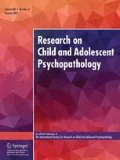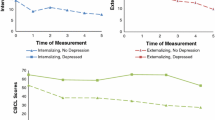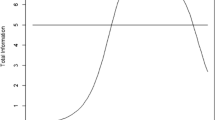Abstract
Few investigations have examined directly the psychosocial functioning of depressed children. In the present study, 20 depressed and 20 nondepressed fourth-and fifth-grade children were observed in free play during their recess period at school, and their self-perceptions were assessed in subsequent individual sessions. The 10 boys and 10 girls in each group were selected according to their scores on both the Child Depression Inventory and the Peer Nomination Inventory of Depression. Analyses conducted on the eight categories of behavioral observations revealed significant differences between the social behavior of the depressed and the nondepressed children. Although the depressed children made more overtures for social contact than did the nondepressed children and were approached by other children more frequently, they spent more time alone and engaged in a higher frequency of negative interactions with their peers. Consistent with these results, the depressed children's responses to the Self-Perception Profile for Children indicated that they experienced themselves as less socially competent in general, as well as less competent across several specific domains of functioning. These findings are discussed as they relate to developmental processes, theories of adult depression, and recent studies on socially isolated children, and directions for future research in this area are offered.
Similar content being viewed by others
References
Beck, A. T. (1967).Depression: Clinical, experimental, and theoretical aspects. New York: Harper & Row.
Beck, A. T., Ward, C. H., Mendelson, M., Mock, J., & Erbaugh, J. (1961). An inventory for measuring depression.Archives of General Psychiatry, 4, 561–571.
Blechman, E. A., Tinsley, B., Carella, E. T., & McEnroe, M. J. (1985). Childhood competence and behavior problems.Journal of Abnormal Psychology, 94, 70–77.
Borke, H. (1971). Interpersonal perception of young children: Egocentrism or empathy?Developmental Psychology, 5, 263–269.
Coyne, J. C. (1976). Toward an interactional description of depression.Psychiatry, 39, 28–40.
Coyne, J. C., Aldwin, C., & Lazarus, R. S. (1981). Depression and coping in stressful episodes.Journal of Abnormal Psychology, 90, 439–447.
Cytryn, L., & McKnew, D. (1972). Proposed classification of childhood depression.American Journal of Psychiatry, 129, 149–155.
Digdon, N., & Gotlib, I. H. (1985). Developmental considerations in the study of childhood depression.Developmental Review, 5, 162–199.
Dodge, K. A. (1983). Behavioral antecedents of peer social status.Child Development, 54, 1386–1399.
Gotlib, I. H. (1982). Self-reinforcement and depression in interpersonal interaction: The role of performance level.Journal of Abnormal Psychology, 91, 3–13.
Gotlib, I. H., & Asarnow, R. F. (1979). Interpersonal and impersonal problem-solving skills in mildly and clinically depressed university students.Journal of Consulting and Clinical Psychology, 47, 86–95.
Gotlib, I. H., & Meltzer, S. J. (1987). Depression and the perception of social skills.Cognitive Therapy and Research, 11, 41–53.
Gotlib, I. H., & Robinson, L. A. (1982). Responses to depressed individuals: Discrepancies between self-report and observer-rated behavior.Journal of Abnormal Psychology, 91, 231–240.
Gottman, J. M. (1977). Toward a definition of social isolation in children.Child Development, 48, 513–517.
Gurtman, M. B. (1986). Depression and the response of others: Reevaluating the reevaluation.Journal of Abnormal Psychology, 95, 99–101.
Harter, S. (1982). The perceived competence scale for children.Child Development, 53, 87–97.
Harter, S. (1983).Supplementary description of the self-perception profile for children: Revision of the perceived competence scale for children. Unpublished manuscript.
Jacobson, R. H., & Anderson, E. (1982). Interpersonal skills deficits and depression in college students: A sequential analysis of the timing of self-disclosures.Behavior Therapy, 13, 271–282.
Jacobson, R. H., Lahey, B. B. & Strauss, C. C. (1983). Correlates of depressed mood in normal children.Journal of Abnormal Child Psychology, 11, 29–40.
Kahn, J., Coyne, J. C., & Margolin, G. (1985). Depression and marital disagreement: The social construction of despair.Journal of Social and Personal Relationships, 2, 447–461.
Kashani, J., & Simonds, J. F. (1979). The incidence of depression in children.American Journal of Psychiatry, 136, 1203–1205.
Kashani, J. H., Husain, A., Shekim, W. O. Hodges, K. K., Cytrn, L., & McKnew, D. H. (1981). Current perspectives on childhood depression: An overview.American Journal of Psychiatry, 138, 143–153.
Kazdin, A. E. (1981). Assessment techniques for childhood depression.Journal of the American Academy of Child Psychiatry, 20, 358–375.
Kazdin, A. E., French, N. H., & Unis, A. S. (1983). Child, mother, and father evaluations of depression in psychiatric inpatient children.Journal of Abnormal Child Psychology, 11, 167–180.
Kovacs, M. (1979).Interim information on the Children's Depression Inventory. Unpublished manuscript, Western Psychiatric Institute and Clinic.
Kovacs, M. (1983).The Children's Depression Inventory: A Self-rated depression scale for schoolaged youngsters. Unpublished manuscript.
Kowalik, D. L., & Gotlib, I. H. (1987). Depression and marital interaction: Concordance between intent and perception of communication.Journal of Abnormal Psychology, 96, 127–134.
Kurdek, L. A., & Krile, D. (1982). A developmental analysis of the relation between peer competence and both interpersonal understanding and perceived social self-competence.Child Development, 53, 1485–1491.
La Greca, A. M. (1981). Peer acceptance: The correspondence between children's sociometric scores and teachers' ratings of peer interactions.Journal of Abnormal Child Psychology, 9, 167–178.
Ledingham, J. E. (1981). Developmental patterns of aggressive and withdrawn behavior in childhood: A possible method for identifying preschizophrenics.Journal of Abnormal Child Psychology, 9, 1–22.
Ledingham, J. E., & Schwartzman, A. E. (1984). A 3-year follow-up of aggressive and with-drawn behavior in childhood: Preliminary findings.Journal of Abnormal Child Psychology, 12, 157–168.
Lefkowitz, M. M., & Testiny, E. P. (1980). Assessment of childhood depression.Journal of Consulting and Clinical Psychology, 48, 43–50.
Lefkowitz, M. M., & Tesiny, E. P. (1982a).Depressive symptoms in children: Prevalence and correlates. Paper presented at the Annual Meeting of the American Psychological Association, Washington, D.C.
Lefkowitz, W. M., & Tesiny, E. P. (1982b).Rejection and depression: Prospective and contemporaneous analyses. Unpublished manuscript, Long Island University.
McConville, B. H., Boag, L. C., & Purohit, A. P. (1973). Three types of childhood depression.Journal of the Canadian Psychiatry Association, 18, 133–138.
Orvaschel, H., Puig-Antich, J., Chambers, W., Tabrizi, M., & Johnson, R. (1982). Retrospective assessment of prepubertal major depression with the Kiddie-Sads-E.Journal of the American Academy of Child Psychiatry, 21, 392–397.
Poznanski, E. P., & Zrull, J. P. (1970). Childhood depression: Clinical characteristics of overly depressed children.Archives of General Psychiatry, 23, 8–15.
Putallaz, M. (1983). Predicting children's sociometric status from their behavior.Child Development, 54, 1417–1426.
Putallaz, M., & Gottman, J. (1981). An interactional model for children's entry into peer groups.Child Development, 52, 986–994.
Rubin, K. H. (1983). Recent perspectives on social competence and peer status: Some introductory remarks.Child Development, 54, 1383–1385.
Sacco, W. P., & Graves, D. J. (1984). Childhood depression, interpersonal problem-solving, and self-ratings of performance.Journal of Clinical Child Psychology, 13, 10–15.
Seagull, E., & Weinshank, A. (1982).Childhood depression as a factor in low academic achievement. Paper presented at the Annual Meeting of the American Psychological Association, Washington, D.C.
Seligman, M. E. P., & Peterson, C. (1986). A learned helplessness perspective on childhood depression: Theory and research. In M. Rutter, C. E. Izard, & P. B. Read (Eds.),Depression in young people: Developmental and clinical perspectives (pp. 223–249). New York: Guilford Press.
Strack, S., & Coyne, J. C. (1983). Social confirmation of dysphoria: Shared and private reactions to depression.Journal of Personality and Social Psychology, 44, 798–806.
Tesiny, E. P., & Lefkowitz, M. M. (1982). Childhood depression: A 6-month follow-up study.Journal of Consulting and Clinical Psychology, 50, 778–780.
Weissman, M. M., & Orvaschel, H., & Padian, N. (1980). Children's symptom and social functioning self-report scales: Comparison of mothers' and children's reports.Journal of Nervous and Mental Disease, 168, 736–740.
Author information
Authors and Affiliations
Additional information
This research was supported in part by Grants MA-8574 from the Medical Research Council of Canada and OMHF No. 923-85/87 from the Ontario Mental health Foundation to the second author.
Rights and permissions
About this article
Cite this article
Altmann, E.O., Gotlib, I.H. The social behavior of depressed children: An observational study. J Abnorm Child Psychol 16, 29–44 (1988). https://doi.org/10.1007/BF00910498
Revised:
Issue Date:
DOI: https://doi.org/10.1007/BF00910498




